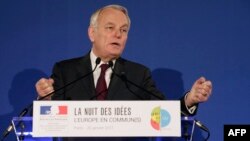France vowed on Monday to defend Iran's nuclear deal, which U.S. President Donald Trump has threatened to tear up, but said it was imperative Tehran abide strictly by the conditions of the accord.
Foreign Minister Jean-Marc Ayrault arrived in the Iranian capital just as relations between Tehran and the new U.S. leadership were strained by new U.S. immigration orders that the French minister called "dangerous" and said should be revoked.
Ayrault said it was in the "common interest" that the 2015 accord under which Iran agreed to curb its nuclear program in return for lifted sanctions was obeyed.
During the U.S. election race Trump had branded it "the worst deal ever negotiated", telling voters he would either rip it up or seek a better agreement.
"I'm coming as the defender of the accord, but to be vigilant and explain that they [the Iranians] must be irreproachable," Jean-Marc Ayrault told reporters after landing in Tehran.
"We harbor real concerns about the U.S. administration's attitude towards this agreement," he said.
French worries over the direction of U.S. policy under Trump go beyond the fate of the Iranian nuclear deal and on Monday Ayrault was scathing in his criticism of the U.S. leader's travel ban against citizens from seven mainly-Muslim countries.
The White House says the temporary immigration orders will help protect Americans from terrorist attacks. In some of the strongest wording from a foreign government, Ayrault said the measures were "dangerous" and amounted to "discrimination."
"This has nothing to do with fighting terrorism," Ayrault told reporters.
When asked whether the U.S. immigration orders should be revoked, Ayrault said: "Yes. I think so." He also said France would double the number of visas available to Iranians.
"Respect Nuclear Deal"
Ayrault is in Iran to reassure Tehran of France and Europe's support for the nuclear deal. The deal was brokered two years ago by the United States, Russia, China, Britain, Germany and France.
Ayrault said that while Tehran had "largely" kept to the terms of the deal, it had pushed the spirit of the accord over the past year by carrying out several ballistic missile tests.
"We want this agreement to be respected," Ayrault said.
The most recent test came on Sunday, according to a U.S. official, who said Iran launched of a medium-range ballistic missile, potentially complicating Ayrault's talks on Tuesday, including with Iranian President Hassan Rouhani.
Paris took one of the hardest lines against Tehran in the negotiations, but has been quick to restore trade ties.
Major French corporations including planemaker Airbus , oil major Total and automobile manufacturers Peugeot and Renault have all signed deals.
Even before the visa ban row, Iranian officials say that concerns about what the U.S. president might do was increasing investor uncertainty and slowing post-sanctions business.
The visit may see some new contracts finalized.
It will also provide an opportunity for talks on Syria.
Paris is a vociferous opponent of Iran's backing of Syria's leader, Bashar al-Assad.
"We will discuss our disagreements, notably on Syria. "We had hoped Iran would be less aggressive in the region," Ayrault said, referring to the period since the nuclear deal.
On Sunday, Trump spoke by telephone with Saudi Arabia's King Salman, a close U.S.-ally in the Middle East. A White House statement said the two leaders agreed on the need to address "Iran's destabilizing regional activities."





